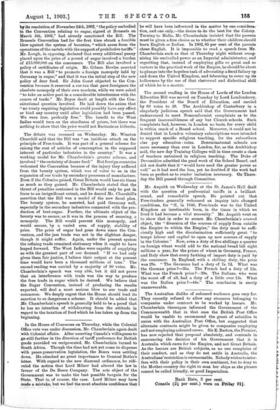Mr. Asquith on Wednesday at the St. James's Hall deall
with the question of preferential tariffs in a brilliant sound, and remarkable speech. He pointed out that Free-traders generally welcomed an inquiry into .changed conditions, for "if, in 1846, Free-trade was to the United Kingdom an inestimable boon, in the times iu which we lived it had become a vital necessity." Mr. Asquith went on to show that in order to secure Mr. Chamberlain's avowed object, the "diversion of the sources of supply from outside the Empire to within the Empire," the duty must be suffi- ciently high and the discrimination sufficiently great "to tempt labour and capital to open up new sources of supply in the Colonies." Now, even a duty of five shillings a quarter on foreign wheat would add to the national bread bill eight millions a year, for the prices of wheat in Germany, France, and Italy show that every farthing of import duty is paid by the consumer. In England, with a shilling duty, the price was 28s. "The Germans had a duty of 7v. 7d. What was the German price P-35s. The French had a duty of 12s. What was the French price P-39s. The Italians, who were the worst off of all, had a duty of a little over 13s. What was the Italian price P-448." The conclusion is surely unanswerable.






































 Previous page
Previous page